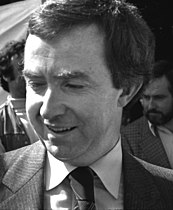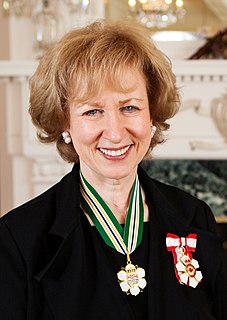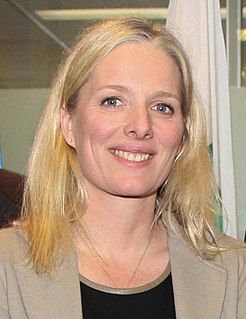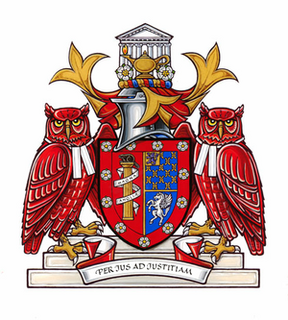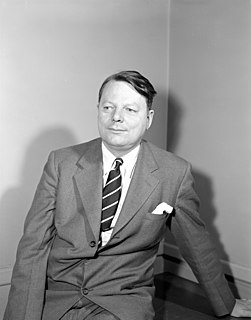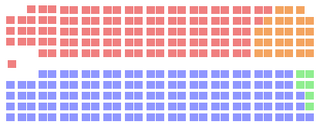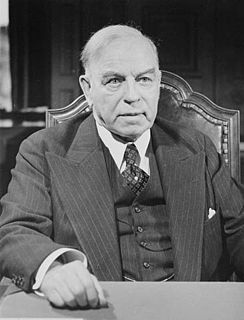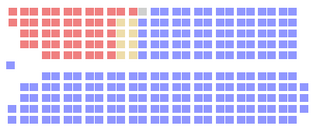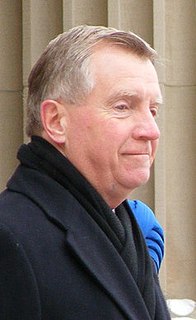
The Prime Minister of Canada is an official who serves as the primary minister of the Crown, chair of the Cabinet, and thus head of government of Canada. Officially, the prime minister is appointed by the Governor General of Canada, but by constitutional convention, the prime minister must have the confidence of the elected House of Commons. Normally, this is the leader of the party caucus with the greatest number of seats in the house. But, if that leader lacks the support of the majority, the governor general can appoint another leader who has that support or may dissolve parliament and call a new election. By constitutional convention, a prime minister holds a seat in parliament and, since the early 20th century, this has more specifically meant the House of Commons. [1]

The prime minister of Canada is the primary minister of the Crown, chairman of the Cabinet, and Canada's head of government. The current, and 23rd, prime minister of Canada is the Liberal Party's Justin Trudeau, following the 2015 Canadian federal election. Canadian prime ministers are styled as The Right Honourable, a privilege maintained for life.
Minister of the Crown is a formal constitutional term used in Commonwealth realms to describe a minister to the reigning sovereign or their viceroy. The term indicates that the minister serves at His/Her Majesty's pleasure, and advises the sovereign or viceroy on how to exercise the Crown prerogatives relative to the minister's department or ministry.
The Cabinet of Canada is a body of ministers of the Crown that, along with the Canadian monarch, and within the tenets of the Westminster system, forms the government of Canada. Chaired by the prime minister, the Cabinet is a committee of the Queen's Privy Council for Canada and the senior echelon of the Ministry, the membership of the Cabinet and ministry often being co-terminal; as of November 2015 there are no members of the latter who are not also members of the former.
Contents
- Prime ministers
- Timeline
- Living former prime ministers
- See also
- References
- Further reading
- External links
The office is not outlined in any of the documents that constitute the written portion of the Constitution of Canada; executive authority is formally vested in the sovereign and exercised on his or her behalf by the governor general. The prime ministership is part of Canada's constitutional convention tradition. The office was modelled after that which existed in Britain at the time. Sir John A. Macdonald was commissioned by the Viscount Monck on 24 May 1867, to form the first government of the Canadian Confederation. On 1 July 1867, the first ministry assumed office. [2]
The Constitution of Canada is the supreme law in Canada. It outlines Canada's system of government and the civil and human rights of those who are citizens of Canada and non-citizens in Canada. Furthermore, its contents are in fact an amalgamation of various codified acts, treaties between the Crown and indigenous peoples, uncodified traditions and conventions. Canada is one of the oldest constitutional democracies in the world.

The monarchy of Canada is at the core of both Canada's federal structure, Westminster-style of parliamentary and constitutional democracy. The monarchy is the foundation of the executive (Queen-in-Council), legislative (Queen-in-Parliament), judicial (Queen-on-the-Bench) branches within both federal and provincial jurisdictions. The sovereign is the personification of the Canadian state and is Queen of Canada as a matter of constitutional law. The current Canadian monarch and head of state is Queen Elizabeth II, who has reigned since 6 February 1952. Elizabeth's eldest son, Prince Charles, is heir apparent.

Sir John Alexander Macdonald was the first prime minister of Canada. The dominant figure of Canadian Confederation, he had a political career which spanned almost half a century.
The date for which a prime minister begins his or her term has been determined by the date that he or she is sworn into his or her portfolio, as an oath of office as prime minister is not required. [3] However, since 1957, the incoming prime minister has sworn an oath as prime minister. [3] Before 1920, prime ministers' resignations were accepted immediately by the governor general and the last day of the ministries were the date he died or the date of resignation. [3] Since 1920, the outgoing prime minister has only formally resigned when the new government is ready to be formed. [3] The Interpretation Act of 1967 states that "where an appointment is made effective or terminates on a specified day, that appointment is considered to be effective or to terminate after the end of the previous day". [3] Thus, although the outgoing prime minister formally resigns only hours before the incoming ministry swears their oaths, both during the day, the ministries are effectively changed at midnight the night before. Some sources, including the Parliament of Canada, apply this convention as far back as 1917. [4] Two prime ministers have died in office: Sir John A. Macdonald (1867–1873, 1878–1891), and John Thompson (1892–1894). All others have resigned, either after losing an election or upon retirement.
A ministry is a governmental organisation, headed by a minister, that is meant to manage a specific sector of public administration. Governments may have differing numbers and types of ministries, but the Brockhaus and Efron Encyclopedic Dictionary notes that all states have a Ministry of Interior, a Ministry of Foreign Affairs, a Ministry of Defense, a Ministry of Justice and a Ministry of Finance. A Ministry of Education or similar is also commonly present.

An oath of office is an oath or affirmation a person takes before undertaking the duties of an office, usually a position in government or within a religious body, although such oaths are sometimes required of officers of other organizations. Such oaths are often required by the laws of the state, religious body, or other organization before the person may actually exercise the powers of the office or any religious body. It may be administered at an inauguration, coronation, enthronement, or other ceremony connected with the taking up of office itself, or it may be administered privately. In some cases it may be administered privately and then repeated during a public ceremony.

The Parliament of Canada is the federal legislature of Canada, seated at Parliament Hill in Ottawa, the national capital. The body consists of the Canadian monarch, represented by a viceroy, the Governor General; an upper house, the Senate; and a lower house, the House of Commons. Each element has its own officers and organization. By constitutional convention, the House of Commons is dominant, with the Senate and monarch rarely opposing its will. The Senate reviews legislation from a less partisan standpoint and the monarch or viceroy provides royal assent to make bills into law.



























